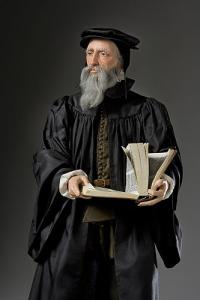This is an installment of a series of replies (see the Introduction and Master List), starting with #56, to portions of Book III of Institutes of the Christian Religion, by early Protestant leader John Calvin (1509-1564). I utilize the public domain translation of Henry Beveridge, dated 1846, from the 1559 edition in Latin; available online. Calvin’s words will be in blue. All biblical citations (in my portions) will be from RSV unless otherwise noted.
Related reading from yours truly:
Biblical Catholic Answers for John Calvin (2010 book: 388 pages)
A Biblical Critique of Calvinism (2012 book: 178 pages)
Biblical Catholic Salvation: “Faith Working Through Love” (2010 book: 187 pages; includes biblical critiques of all five points of “TULIP”)
John Calvin: Catholic Appraisal (Web Page)
Calvinism & General Protestantism: Catholic Critique (Web Page)
*****
III, 2:10, 21, 31
*****
1) Faith: Its Definition Set Forth, and Its Properties Explained.
But as this shadow or image of faith is of no moment, so it is unworthy of the name. How far it differs from true faith will shortly be explained at length. Here, however, we may just indicate it in passing. Simon Magus is said to have believed, though he soon after gave proof of his unbelief, (Acts 8:13-18.) In regard to the faith attributed to him, we do not understand with some, that he merely pretended a belief which had no existence in his heart: we rather think that, overcome by the majesty of the Gospel, he yielded some kind of assent, and so far acknowledged Christ to be the author of life and salvation, as willingly to assume his name. In like manner, in the Gospel of Luke, those in whom the seed of the word is choked before it brings forth fruit, or in whom, from having no depth of earth, it soon withereth away, are said to believe for a time. Such, we doubt not, eagerly receive the word with a kind of relish, and have some feeling of its divine power, so as not only to impose upon men by a false semblance of faith, but even to impose upon themselves. They imagine that the reverence which they give to the word is genuine piety, because they have no idea of any impiety but that which consists in open and avowed contempt. But whatever that assent may be, it by no means penetrates to the heart, so as to have a fixed seat there. Although it sometimes seems to have planted its roots, these have no life in them. The human heart has so many recesses for vanity, so many lurking places for falsehood, is so shrouded by fraud and hypocrisy, that it often deceives itself. Let those who glory in such semblances of faith know that, in this respect, they are not a whit superior to devils. The one class, indeed, is inferior to them, inasmuch as they are able without emotion to hear and understand things, the knowledge of which makes devils tremble, (James 2:19.) The other class equals them in this, that whatever be the impression made upon them, its only result is terror and consternation. (III, 2:10)
[T]he saying of John, in his Epistle, is fulfilled, “This is the victory that overcometh the world, even our faith,” (1 John 5: 4.) It is not said that it will be victorious in a single fight, or a few, or some one assault, but that it will be victorious over the whole world, though it should be a thousand times assailed. (III, 2:21)
These examples certainly show that error is often mingled with faith; and yet that when faith is real, it always obtains the preeminence. For as the particular error of Rebekah did not render the blessing of no effect, neither did it nullify the faith which generally ruled in her mind, and was the principle and cause of that action. In this, nevertheless, Rebekah showed how prone the human mind is to turn aside whenever it gives itself the least indulgence. But though defect and infirmity obscure faith, they do not extinguish it. (III, 2:31)
Here, Calvin is trying to draw a distinction between the true saving faith of the elect and what he calls not “true faith” and “some kind of assent” and “a false semblance of faith” and (in the next section 11) not the “same faith.” The problem he has (as so often) is with Holy Scripture and Jesus.
Luke 22:32 but I have prayed for you that your faith may not fail . . .
From this we learn two important things: 1) Peter had faith, and 2) it could possibly fail. If it couldn’t possibly fail, then Jesus’ prayer makes no sense. Neither Jesus nor anyone else prays for things not to happen that can’t ever possibly happen anyway. We don’t pray that basic mathematics not fail, so that, tomorrow, 2+2 won’t = 5. It can’t change, and so there is no need to pray that it won’t change. No one could pray that God would cease being eternal, or that Jesus wouldn’t return in the Second Coming, because those things are impossible and can never happen.
Therefore, Peter’s faith could have possibly failed, which means (by straightforward logical extension) that anyone’s faith could do so. But Calvin does the notorious “Calvinist runaround” and special pleading (circular reasoning) and asserts that “faith” which is not possessed forever by someone (faith in a person who falls away) wasn’t ever “really” faith. Sorry, we must go with what the inspired biblical revelation teaches (in this case, from Jesus Himself). But there is much more:
Acts 11:23 . . . he exhorted them all to remain faithful to the Lord with steadfast purpose;
Romans 11:20-22 They were broken off because of their unbelief, but you stand fast only through faith. So do not become proud, but stand in awe. [21] For if God did not spare the natural branches, neither will he spare you. [22] Note then the kindness and the severity of God: severity toward those who have fallen, but God’s kindness to you, provided you continue in his kindness; otherwise you too will be cut off.
1 Corinthians 16:13 Be watchful, stand firm in your faith, be courageous, be strong.
2 Corinthians 1:24 . . . you stand firm in your faith.
2 Corinthians 13:5 Examine yourselves, to see whether you are holding to your faith. Test yourselves. Do you not realize that Jesus Christ is in you? — unless indeed you fail to meet the test!
1 Timothy 2:15 Yet woman will be saved through bearing children, if she continues in faith and love and holiness, with modesty.
1 Peter 5:9 Resist him, firm in your faith, . . .
Revelation 2:10 . . . Be faithful unto death, and I will give you the crown of life.
These passages all presuppose and therefore demonstrate the same idea: one can possess true faith (we know that because the inspired Bible stated that they did) and that this faith can be rejected or lost. Losing it or potentially doing so (which warnings against losing it presuppose) don’t prove that it was inauthentic. If that were the case, then the Bible could never refer to “faith” in these instances being possessed and possibly or actually lost. It’s a lot of Scripture (nine very clear passages) for Calvin to directly oppose. But he tries in vain to do so, anyway (bless his heart).
***
Practical Matters: Perhaps some of my 4,200+ free online articles (the most comprehensive “one-stop” Catholic apologetics site) or fifty-one books have helped you (by God’s grace) to decide to become Catholic or to return to the Church, or better understand some doctrines and why we believe them.
Or you may believe my work is worthy to support for the purpose of apologetics and evangelism in general. If so, please seriously consider a much-needed financial contribution. I’m always in need of more funds: especially monthly support. “The laborer is worthy of his wages” (1 Tim 5:18, NKJV). 1 December 2021 was my 20th anniversary as a full-time Catholic apologist, and February 2022 marked the 25th anniversary of my blog.
PayPal donations are the easiest: just send to my email address: [email protected]. You’ll see the term “Catholic Used Book Service”, which is my old side-business. To learn about the different methods of contributing, including 100% tax deduction, etc., see my page: About Catholic Apologist Dave Armstrong / Donation Information. Thanks a million from the bottom of my heart!
***
Photo credit: Historical mixed media figure of John Calvin produced by artist/historian George S. Stuart and photographed by Peter d’Aprix: from the George S. Stuart Gallery of Historical Figures archive [Wikimedia Commons / Creative Commons Attribution-Share Alike 3.0 Unported license]
***
Summary: John Calvin argues that genuine, authentic faith can never be lost, & if “faith” is lost, it wasn’t ever the real thing. I refute this error with nine clear Bible passages.














